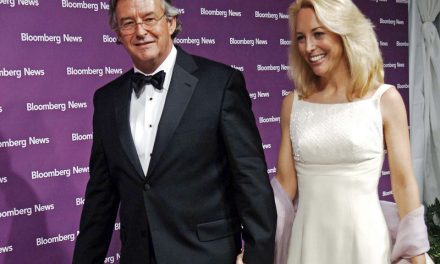Image Credits: AP Photo/John Minchillo.
When does a lie become so pervasive and consequential that its truth can no longer be responsibly debated? Maybe when a deluded mob starts an insurrection and storms the Capitol to stop the certification of presidential election results.
The events of January 6 were inspired by two enormous lies. One was that President Trump was robbed of victory in the 2020 presidential election. The other was the QAnon conspiracy theory. Both lies were encouraged by the president, and both contributed to the loss of life.
On August 19, 2020, President Trump gave a rare non-coronavirus-related press conference from the James S. Brady Press Briefing Room in the White House to announce he was reneging on the terms of the Iran Nuclear Deal. The first question he received, however, was about the growth of the QAnon conspiracy group. He responded, “Well, I don’t know much about the movement, other than I understand they like me very much, which I appreciate.”
This invited a follow-up question:
Asked if he believed the crux of the theory, described by a reporter asthe belief that the President “is secretly saving the world from this satanic cult of pedophiles and cannibals,” Trump said: “Well, I haven’t heard that, but is that supposed to be a bad thing or a good thing?”
“If I can help save the world from problems, I’m willing to do it,” he went on. “I’m willing to put myself out there. And we are, actually, we’re saving the world from a radical left philosophy that will destroy this country.”
On January 6, 2021, Ashli Babbitt, a 35 year-old Air Force veteran and QAnon supporter, was shot and killed by a Capitol Police officer as she tried to move into the Capitol through a broken window.
Babbitt was a loyal Fox News watcher, according to thousands of tweets to Fox News hosts, but she also engaged on social media with the conspiracy news internet news site InfoWars. In 2020, Babbitt began to tweet with QAnon accounts and use QAnon hashtags. QAnon conspiracy theorists subscribe to a false belief that high-profile Democrats and Hollywood celebrities are ritually sacrificing children and that Trump is fighting to stop it.
A few hours later, 34 year-old QAnon devotee Rosanne Boyland became one of three insurrectionists to die of medical complications when she collapsed in the Capitol Rotunda after storming the building. She may have been trampled on the way in.
Boyland’s brother-in-law, Justin Cave, said “My own personal belief is that…the president’s words and rhetoric incited a riot that killed four of his biggest fans.”
Of course, President Trump spent much more time and energy stoking the other conspiracy theory about a “stolen” election. In a July 9, interview with Chris Wallace of Fox News, the president stated that mail-in voting was going to rig the election and refused to say that he’d accept the results if he lost, “I’m not a good loser. I don’t like to lose,” he said. “I don’t lose too often. I don’t like to lose.”
We know the rest of the story. He was soundly defeated in the election but refused to concede, made false allegations of fraud, and dispatched a mob to the Capitol to stop the Electoral College count.
Prior to the election, social media was already grappling with how disinformation was spreading on their platforms, inspiring violence and undermining confidence in our elections.
In September, Twitter and Facebook began putting warning labels on Trump posts that spread lies about mail-in voting.
In October, Facebook started banning QAnon groups and YouTube began taking down QAnon videos. On Friday, Twitter followed suit and banned thousands of QAnon-supporting accounts, including the ones belonging to former National Security Adviser Michael Flynn and former Trump attorney Sidney Powell.
Post-insurrection reaction from the big tech companies has been swift and harsh. Trump was permanently kicked off Twitter, denying him access to his 88 million followers, many of whom moved to conservative alternative Parler. Google and Apple then removed Parler from their Application stores and Amazon booted it off their servers. As of Monday, Parler was offline.
It’s not just social media sites that are looking to shut down the lies. On January 6, the day of the insurrection, Cumulus Media, which hosts many of the most popular right-wing talk radio shows, issued a directive that their “on-air personalities…stop suggesting that the election was stolen from President Trump — or else face termination.”
And then there are the Republican lawmakers who supported Trump’s efforts to challenge the Electoral College and thereby helped incite the deadly riot at the Capitol. In the Senate, the ringleaders, Josh Hawley of Missouri and Ted Cruz of Texas, both of whom seemed to think it would help their 2024 presidential aspirations, were condemned loudly at home.
In St. Louis, on Saturday, protestors chanted “No Hawley. No KKK. No fascist USA,” and called on him to resign which might not be notable except they were echoing the St. Louis Post-Dispatch’s editorial board, which called for Hawley’s resignation on Thursday. The Houston Chronicle ’s editorial board asked Ted Cruz to resign on Friday.
The Associated Press reports that many of the 139 Republican congressmembers who voted against certifying Biden’s presidential victory are facing condemnations and calls to resign from protestors and editorial boards in their home districts.
All of these actions share one thing in common. They are efforts to define the false beliefs that inspired the insurrection as outside the arena for debate.
Distinctions are important. Democrats Rep. Stephanie Tubbs Jones and Sen. Barbara Boxer alleged “widespread irregularities” to challenge the results in Ohio in the 2004 election which handed the election to George W. Bush. (John Kerry had already conceded and it was questioning one aspect of one state not alleging a mass conspiracy.) But that’s different in degree and kind than what happened in 2020 when the president and his supporters sought to overturn multiple state contests based on allegations that had been thoroughly rejected by the courts. Kate Ruane, an A.C.L.U. lawyer, raised a good point when she told the New York Times, “it should concern everyone when companies like Facebook and Twitter wield the unchecked power to remove people from platforms that have become indispensable for the speech of billions.”
On the other hand, it should concern everyone when a mob fed on lies assaults the Capitol while chanting “Hang Mike Pence.” It should concern everyone that the #HangMikePence hashtag trended on Twitter after the president’s account was suspended.
At least since Justice Robert Jackson’s famous 1949 dissent in Terminiello v. City of Chicago where he argued the First Amendment isn’t a “suicide pact,” the country has struggled to find the right balance between protecting free speech and protecting the public.
That case involved a Catholic priest who had been fined $100 for inciting a riot with racist and inflammatory rhetoric. Justice William Douglas, writing for the majority, overturned the fine:
… Speech is often provocative and challenging. It may strike at prejudices and preconceptions and have profound unsettling effects as it presses for acceptance of an idea. That is why freedom of speech, though not absolute is nevertheless protected against censorship or punishment, unless shown likely to produce a clear and present danger of a serious substantive evil that rises far above public inconvenience, annoyance, or unrest.
The insurrection at the Capitol certainly qualifies as a “substantive evil,” as it struck at the very heart of our system of government. But it’s harder to point to one discrete act that caused it. Rather, it was the result of a variety of factors, some technological, some cultural, and some arising from the peculiar mind of Donald Trump.
What’s clear is that lies were allowed to grow and fester until a mass delusion created “a clear and present danger.” The country is now trying to cool this fever before it kills the body politic.. The failed coup certainly justifies this treatment.
But disabusing Americans of these lies is complicated by the complicity of so many Republicans. How can they be part of the solution when they really should be held to account instead?
It an ideal world Republican officials and broadcasters would consistently and emphatically declare that Biden won the election and QAnon is a hoax. But there needs to be accountability, too, starting with President Trump who clearly incited the insurrection.
His lies finally became so pervasive and consequential that the country couldn’t withstand the pressure. Now his followers and enablers are de-platformed and their arguments are not necessarily considered protected speech.
This, too, will be part of Trump’s legacy. He violated every norm and pushed everything to the breaking point. He led the Republican Party so far astray that many of their applause lines are now unsuitable for publication.
This won’t be fixed easily or quickly, but the road to recovery begins on January 20.







